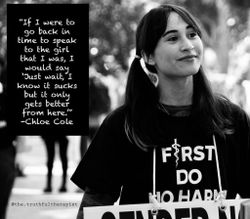Jul 26, 2023
Chloe Cole

Chloe Cole (born 2004 or 2005) is an American activist who opposes gender-affirming care for minors and supports bans on such care following her own detransition. She has appeared with conservative politicians and in the media, supporting and advocating for such bans. Cole says that she began transitioning at 12 and detransitioned at 17 after having undergone treatment which included puberty blockers, testosterone, and a double mastectomy.
Why did she want to change gender in the first place?
(Chloe said on the interview with The Daily Signal Podcast)
At school, I was getting bullied a lot from a young age. I tended to struggle in my classes and with socialization. In fourth grade I finally managed to make a group of friends and that was kind of the first time that I ever really felt, I guess you could say, included with my peers. But then I had to move schools pretty quickly after that and I was basically back at square one.
The second elementary middle school that I went to, there was a lot of favoritism among students and I was not one of the favorite students. I was actually getting mistreated by both students and staff. So I was pretty lonely. I turned to the internet and I got my first phone when I was 11 because it was quite difficult for me to make friends.
My parents tried to get me diagnosed for autism because a lot of my teachers would tell them that they noticed that I had some pretty distinct signs of being on the spectrum, but when they tried to get me diagnosed, the physician just told them, “Oh, no, she’s too smart to be autistic. There’s no way she’s autistic.” When they tried to get a second opinion, my health care provider just said no. And then they got me a diagnosis for ADHD instead. And then they started medicating me at 10.
When I started using social media at 10, no, 11, by that point in time, I had some body image issues. I was kind of a tomboy from a young age. I wasn’t very developed, especially not in my chest area, but I did have slightly larger shoulders. I did have a bit more muscle in my body from being a little bit more on the athletic side.
I liked having my hair short, but I often felt like I couldn’t match up to other girls in terms of appearance. I had difficulty socializing with them and maintaining friendships with them, so I started to wonder if something was wrong with me. And I often felt like I would be better off as a boy.
Social media introduced this idea that I could be a boy. A lot of the feminist content I was seeing alongside the LGBT content that I was exposed to painted a very negative picture of being a woman, being feminine.
Despite being tomboy, I had a feminine side, but I was ashamed of it because a lot of cartoons and other children’s content I would consume growing up kind of was focused on boys and it kind of portrayed girls and especially feminine girls as stupid and not really contributing anything to the story and just being a nuisance. I wanted to be something more than that, you know?
But also, from other women and girls growing up, I would often hear about the negative parts of the female experience, like how painful periods and childbirth and pregnancy and menopause are. And nobody ever really talked about all the good things that come with those things.
Naturally, hearing all of those things about growing from a girl into a woman made me not want to do that. I also hit puberty from a young age. It kind of just hit me full force.
Why did she want to De-transition the gender?
About a year after my surgery, I started taking a class on psychology in my junior year. One of the chapters was focused on child development and parenting. I learned that breastfeeding is not only that, but it also plays a role in the bond between mother and child, and that bond goes on to affect that child’s later cognitive and emotional and social functioning.
Upon reading this, I felt like a monster. I realized that I took something novelly for myself, but also potentially from my future children. I think that’s when the realization really hit that I shouldn’t have been allowed to go through this.
Not only that, but also the lessons about cognitive and emotional development in kids and teenagers made me realize that at an age where everybody really naturally is prone to making some pretty rash decisions, I was allowed to make one that was permanent under the guidance of adults, medical professionals.
A few weeks later, I decided to stop transitioning entirely. It was too much for me, and I knew that I couldn’t keep lying to myself. I went cold turkey off of testosterone. The school year that followed was really tough.
What she says we should do?
“Spend time with your kids, keep them off technology for as long as possible. Let them know they’re loved and stay in touch with them. If they’re on the internet, monitor their usage,” she urged parents.
“Adults need to take a stand,” Cole emphasized. “Complacency is what led to this happening to me in the first place.”
“If you look away for even a second, it’s very contagious,” Cole said, speaking of what she calls “skewed information” that medical professionals are sharing on the internet.

Hypospadias (hi-poe-SPAY-dee-us) is a birth defect (congenital condition) in which the opening of the urethra is on the underside of the penis instead of at the tip. The urethra is the tube through which urine drains from your bladder and exits your body.
Glossary:
Opposes: Againts
Back at square one: start from the beginning
Nuisance: burden, problem
Novelly: New or unusual
Go cold turkey: to withdraw suddenly and completely from an addictive substance or some other form of dependency
Complacency: contentment, self-satisfied
By undefined
15 notes ・ 13 views
Indonesian
Beginner